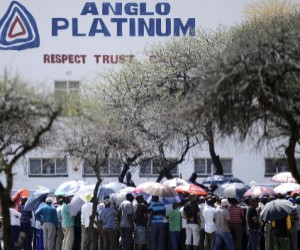The announcement by Anglo American Platinum of its latest restructuring plans has again underscored the level of political and labour pressure with which South African businesses have to contend. I
It impacts seriously on business and investment decisions and threatens the successful implementation of the government’s National Development Plan (NDP).
Over the past two decades, business in South Africa has increasingly been exposed to direct policy and legislative interventions.
Among these are those promoting black economic empowerment and rigid labour laws.
Among more recent new legislative developments that could impact very negatively on businesses and specific sectors is a draft law requiring all businesses, including informal traders, to be licensed.
In this instance, massive public pressure seems to have moved government to redraft the bill.
Similarly, however, new liquor laws introduced in some provinces will impact negatively on the hospitality and tourism sectors and may have consequences going far beyond the stated objectives.
An anticipated new tax regime for the mining sector is also in the pipeline. And there is more.
Political issues such as the long-running debate over the nationalisation of mines have created uncertainty and deterred investors – with detrimental consequences for the economy and job creation.
And while ‘big brother’ looms large in the background, workers and labour unions have run amok with excessive wage demands, escalating more militant and often wildcat strikes.
Demands are often outside the ambit of regulated industrial relations, are violent and destructive, and accompanied by labour unrest and the fallout from union turf wars.
In the political arena, the continuously changing policy, legislative and regulatory environments pertaining to, among others, education and training are exacerbating rather than relieving a pressing skills shortage.
This adds a third major headache for company chief operating officers.
A skills shortage is a global problem, but political interventions such as the Minister of Higher Education, Blade Nzimade’s, latest plans for sector education and training authorities, are complicating matters further in South Africa.
Much of this is perhaps discernible as part of a global trend in reaction to the recession that started in 2008.
Worldwide, governments tend to intervene more directly in business and markets, and a kind of creeping socialism seems to have set in.
In South Africa, of most concern are the much more direct interventions, pressures and threats exerted by government on businesses.
For instance, a few years back the government tried to prescribe to the London-based mining multinational Anglo American plc, with its extensive South African operations, on whom it should appoint as chairperson.
More recently, when the consequences of labour unrest and weak market conditions forced Anglo American Platinum (Amplats) into business decisions involving restructuring plans – including shaft closures and the likely retrenchment of 14 000 workers – government joined labour in condemning the plans and the entire Anglo group.
The Minister of Mineral Resources, Susan Shabangu, even threatened to withdraw Anglo’s mining licences.
Last week, Amplats chief executive Chris Griffiths announced the revised restructuring plan limiting retrenchments to 6 000 workers and “optimisation” of the troubled shafts and mines.
He tried to put a positive spin on it by positioning it as the result of interaction between his company, government and the unions.
However, everyone else interpreted it as Amplats backing down in the face of political pressure, creating a dangerous precedent for mining in particular and business in South Africa in general.
The effect on investors saw Amplats stocks plunge as a direct result of perceptions that government and labour had exerted extreme pressure on the company.
Global investment and banking group Goldman Sachs responded in a report as follows: "The reaction of listed miners in South Africa is negative, as it calls into question the ability for management to implement the corrective measures for the benefit of shareholders”.
In announcing the revised plans, Griffiths did acknowledge the impact of political and labour considerations.
The company had to engage in discussions with its employees, unions and the government ahead of making the announcement.
Amplats said it would now again consult with labour unions on whether there were alternatives to limit the proposed job cuts.
But despite its engagement with workers and unions and the concessions already made, unions have vowed to oppose the plan and may even go on strike.
This time government has remained silent – at least for now.
A statement by Cosatu's spokesperson, Patrick Craven, reacting to the revised Amplats plan, made it clear that South Africa’s biggest labour federation and ally of the governing African National Congress expects companies to retain all employees regardless of economic and/or business conditions and damage inflicted by illegal strikes, labour violence and destruction, which undermine viability and survival.
In the latest quarterly International Business Report released by Grant Thornton last week, 36% of the chief executives interviewed said uncertainty about South Africa’s future political direction is affecting their business decisions; 32% said current conditions were causing them to postpone investment decisions; 19% were rather investing offshore, while 7% were considering closing down altogether, or emigrating.
The latest Global Entrepreneurship Monitor report, released earlier this year, showed that rigid labour laws, crime and corruption were standing in the way of entrepreneurial growth.
And the 16thAnnual Global CEO Survey just released by PricewaterhouseCoopers identifies the lack of skills in South Africa as a major headache for COOs.
Meanwhile, turf wars between rival unions last week again triggered wildcat strikes at Lonmin shafts near Marikana, scene of last year’s violence that shocked the world.
Speaking at the Sub-Saharan Africa Credit Risk Conference in Sandton last week, Moody’s analysts said that revived labour unrest in South Africa's mining industry could impact export competitiveness and threaten the country’s credit rating.
The agency last year downgraded South Africa’s government bond rating, citing political and policy concerns.
Moody’s senior vice president Kristin Lindow said the outlook remained negative because of uncertainty over government policies.






